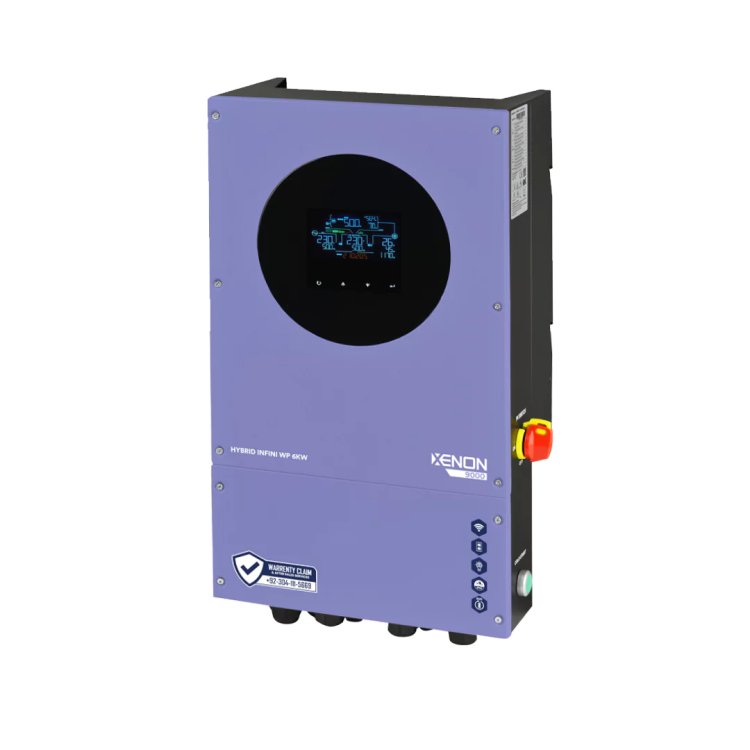The Heartbeat of Solar Energy: Understanding Solar Inverters
Discover the importance of solar inverters in your solar power system. Learn about types, benefits, and tips for choosing the right solar inverter for your needs.
Share this Post to earn Money ( Upto ₹100 per 1000 Views )

As the world increasingly embraces renewable energy, solar power stands at the forefront of this transformation. A critical component of any solar power system is the solar inverter. In this guide, we will explore the importance of solar inverters, their different types, benefits, and how to choose the right one for your needs.
The Role of Solar Inverters
What Are Solar Inverters?
Solar inverters are essential for converting the direct current (DC) produced by solar panels into alternating current (AC), which is used by most household appliances. Without solar inverters, the energy generated by your solar panels would be unusable for everyday needs. This conversion process is vital, making solar inverters the heartbeat of any solar power system.
Why Are They Important?
Solar inverters not only convert DC to AC but also optimize the energy output from your solar panels. They ensure that your system operates efficiently, maximizing the amount of usable energy produced. Additionally, modern solar inverters come equipped with monitoring capabilities, allowing you to track the performance of your system in real-time and identify any issues promptly.
Types of Solar Inverters
String Inverters
String inverters are the most common type used in residential solar power systems. They connect a series of solar panels, known as a string, to a single inverter. This setup is cost-effective and straightforward, making it popular among homeowners. However, the efficiency of string inverters can be compromised if one of the panels in the string is shaded or not performing optimally.
Microinverters
Microinverters are installed on each individual solar panel, allowing them to operate independently. This means that shading or a malfunction on one panel does not affect the others. Microinverters offer higher efficiency and are ideal for roofs with complex layouts or partial shading. Despite being more expensive, their benefits often justify the investment.
Benefits of Using Solar Inverters
Enhanced Efficiency
One of the primary benefits of solar inverters is their ability to enhance the overall efficiency of your solar power system. By converting DC to AC efficiently, solar inverters ensure that you get the most out of the energy produced by your panels. This results in lower electricity bills and a faster return on investment.
Real-time Monitoring
Modern solar inverters come with advanced monitoring features that allow you to track the performance of your solar system in real-time. This capability helps you identify and address any issues quickly, ensuring that your system runs smoothly and efficiently. Regular monitoring also helps in maintaining the longevity of your solar inverters and panels.
Choosing the Right Solar Inverter
Assessing Your Energy Needs
Before purchasing a solar inverter, it's crucial to assess your energy needs. Consider your average electricity consumption, the size of your solar panel array, and any potential shading issues. This assessment will help you determine the type and capacity of the solar inverter that best suits your requirements.
Comparing Brands and Models
When it comes to selecting a solar inverter, quality and reliability are key. Research different brands and models, paying attention to customer reviews and industry ratings. Brands like SMA, Enphase, and SolarEdge are well-known for their high-quality solar inverters. Comparing features such as efficiency, warranty, and additional functionalities will help you make an informed decision.
Installation and Maintenance
Professional Installation
For optimal performance, it’s crucial to have your solar inverter installed by a professional. Proper installation ensures that the system is set up correctly and safely. A professional installer can also provide valuable advice on the best location for your solar inverters to maximize efficiency.
Regular Maintenance
While solar inverters require minimal maintenance, regular checks are essential to ensure long-term performance. Clean the inverter units periodically to prevent dust buildup, and monitor the system's performance to catch any issues early. A well-maintained solar inverter can last over a decade, providing reliable energy conversion throughout its lifespan.
Future Trends in Solar Inverters
Smart Inverters
The future of solar inverters looks promising with the advent of smart inverters. These advanced devices offer enhanced grid support capabilities, ensuring a stable and resilient power supply. Smart inverters can communicate with the grid, helping to balance supply and demand effectively.
Energy Storage Integration
Combining solar inverters with energy storage solutions like batteries is another exciting trend. This integration allows for greater energy independence and better management of power consumption. It enables homeowners to store excess energy produced during the day for use during the night or during power outages.
Conclusion
Solar inverters are a vital component of any solar power system, converting solar energy into usable electricity efficiently and reliably. By understanding the types, benefits, and maintenance tips of solar inverters, you can make informed decisions to maximize the performance and longevity of your solar power system. Embrace the future of energy with solar inverters, and take a step towards a sustainable and eco-friendly lifestyle.







